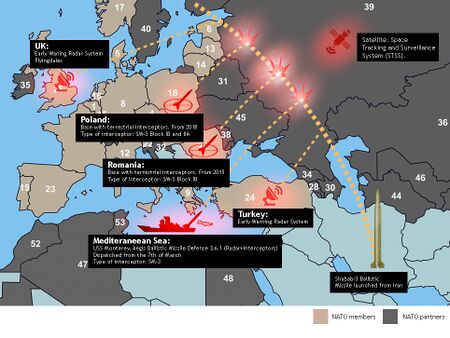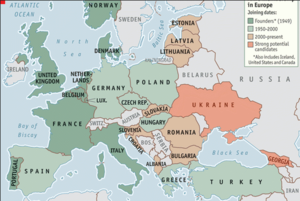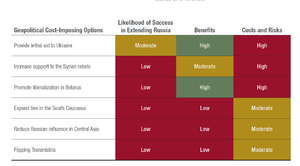Russia/Encirclement
 | |
| Interest of | • 2022 Russian invasion of Ukraine • William Engdahl • NATO • Jochen Scholz |
The encirclement of Russia is a tactic by the United States, utilizing NATO, to place military capability (not necessarily through many soldiers or equipment) close to the territory of Russia.
Francis_Boyle argued that Russia was cornered, its military action provoked and Putin was aware of this and the possible intervention of "UN peace forces" (led by NATO).
Contents
Official Narrative
There is no encirclement, argument to the contrary can only be Russian propaganda.[1]
Concerns
During the Cold War the NATO armies in Western Europe had a much higher number of soldiers than at present. But this is irrelevant, as a modern war between NATO and Russia would probably not be fought with conventional forces to start with, but with a surprise first strike against leadership and nuclear forces.[2] Whatever remains from the retaliatory capability of Russia's nuclear forces will be dealt with, with the missile defense shield that has been planned for Europe since the 2000s;[3][4][5][6][7][8] adding to that is the US nuclear force modernization program.
| Nuclear Strategy For Beginners - Part 1 (1984) / the documentary notes (~17:30 min): [...] In response to Sputnik, the US speeded up its own missile program to close what it saw as a missile gap. By the late 50s it was able to begin basing these intermediate-range missiles in Italy and Turkey, encircling the Soviet Union. Sputnik also forced a re-evaluation of massive retaliation [...] |
“Though it is clear that present-day Russia poses no threat to them, Nato is methodically and persistently building up its military machine.”
Alexander Solzhenitsyn (April 2006) [9]
“preparing to completely encircle Russia and deprive it of its sovereignty”
Alexander Solzhenitsyn (April 2006) [9]
NATO expansion
Since 1990 NATO has expanded eastward. This includes determinedly building a strong pro-NATO faction in neutral Sweden, Finland and even Austria. Part of this effort includes drawing these three countries in through EU security cooperation and partnership agreements.
US diplomatic cables
A diplomatic message sent by ambassador William J. Burns from February 1, 2008, highlights the fact that Ukraine's and Georgia's aspirations for NATO membership are seen as major problems by Russia and that the diplomat is well aware of their position:[10][11]
Ukraine and Georgia's NATO aspirations not only touch a raw nerve in Russia, they engender serious concerns about the consequences for stability in the region. Not only does Russia perceive encirclement, and efforts to undermine Russia's influence in the region, but it also fears unpredictable and uncontrolled consequences which would seriously affect Russian security interests. Experts tell us that Russia is particularly worried that the strong divisions in Ukraine over NATO membership, with much of the ethnic-Russian community against membership, could lead to a major split, involving violence or at worst, civil war. In that eventuality, Russia would have to decide whether to intervene; a decision Russia does not want to have to face.
2019 RAND Report
In 2019, the deep state think tank RAND published the report Overextending and Unbalancing Russia. It listed a number of strategies for getting "Russia to extend itself in strategic competition." It is noticeable that a number of the suggestions in report has been followed by policy makers. Discussing "Providing lethal aid to Ukraine" it "would exploit Russia’s greatest point of external vulnerability. But any increase in U.S. military arms and advice to Ukraine would need to be carefully calibrated to increase the costs to Russia of sustaining its existing commitment without provoking a much wider conflict in which Russia, by reason of proximity, would have significant advantages."[12]
See also
Related Quotations
| Page | Quote | Author | Date |
|---|---|---|---|
| 2022 Russian invasion of Ukraine | “I asked them – are you with us?” Zelensky said. “They answered that they are with us, but they don’t want to take us into the alliance. I’ve asked 27 leaders of Europe, if Ukraine will be in NATO, I’ve asked them directly — all are afraid and did not respond We were left by ourselves. Who is ready to go to war for us? Honestly, I don’t see anybody. Who is ready to give Ukraine guarantees of NATO membership? Honestly, everybody is afraid” | Russia Today Volodymyr Zelensky | 24 February 2022 |
| 2022 Russian invasion of Ukraine/Preparation | “Russia behind the Headlines has published an interview with Gorbachev, who was Soviet president during the discussions and treaty negotiations concerning German reunification. The interviewer asked why Gorbachev did not “insist that the promises made to you [Gorbachev]—particularly U.S. Secretary of State James Baker’s promise that NATO would not expand into the East—be legally encoded?” Gorbachev replied: “The topic of ‘NATO expansion’ was not discussed at all, and it wasn’t brought up in those years. … Another issue we brought up was discussed: making sure that NATO’s military structures would not advance and that additional armed forces would not be deployed on the territory of the then-GDR after German reunification. Baker’s statement was made in that context… Everything that could have been and needed to be done to solidify that political obligation was done. And fulfilled.” Gorbachev continued that “The agreement on a final settlement with Germany said that no new military structures would be created in the eastern part of the country; no additional troops would be deployed; no weapons of mass destruction would be placed there. It has been obeyed all these years.” To be sure, the former Soviet president criticized NATO enlargement and called it a violation of the spirit of the assurances given Moscow in 1990, but he made clear there was no promise regarding broader enlargement.” | Brookings Institution Russia Beyond | November 2014 |
| Yossef Bodansky | “According to Yossef Bodansky, then Director of the US Congressional Task Force on Terrorism and Unconventional Warfare, Washington was actively involved in "yet another anti-Russian jihad, seeking to support and empower the most virulent anti-Western Islamist forces." Bodansky revealed the entire CIA Caucasus strategy in detail in his report, stating that US Government officials participated in "a formal meeting in Azerbaijan in December 1999 in which specific programs for the training and equipping of Mujahideen from the Caucasus, Central/South Asia and the Arab world were discussed and agreed upon, culminating in Washington's tacit encouragement of both Muslim allies (mainly Turkey, Jordan and Saudi Arabia) and US "private security companies'. . . to assist the Chechens and their Islamist allies to surge in the spring of 2000 and sustain the ensuing Jihad for a long time…Islamist Jihad in the Caucasus as a way to deprive Russia of a viable pipeline route through spiraling violence and terrorism".” | William Engdahl Yossef Bodansky | 2015 |
| Cold War II | “The United States remains the world’s leading power with global interests, and it cannot afford to choose between Europe and the Indo-Pacific. Instead, Washington and its allies should develop a defense strategy capable of deterring and, if necessary, defeating Russia and China at the same time.” | Atlantic Council Matthew Kroenig | 18 February 2022 |
| Nigel Gould-Davies | “For Azerbaijan, [the reconquest of Nagorno-Karabakh] is a total victory won by the cruel, hard methods of military force and economic blockade, together with training and equipment from Turkey....But the key question is how relations between the west and Azerbaijan will develop. The west's energy ties with the oil and gas-rich country are more important than ever as it weans itself off Russian supplies. Now there are new security possibilities, especially in light of the war in Ukraine. Azerbaijan is the only country that borders both Russia and Iran, two western adversaries whose ever-closer relations evoke growing alarm. Azerbaijan’s ties with Turkey, a Nato member that also provides weapons support to Ukraine, means that it is receiving military training according to the alliance's standards. All this offers the potential for a deeper relationship, if the west has the strategic imagination to grasp it.” | Nigel Gould-Davies | 5 October 2023 |
| Ben Hodges | “The Russians have zero, zero positive outcomes if they use a nuclear weapon. There's no benefit for them if they use it...The Army, the Air Force, all of our services are constantly training, preparing, maintaining a level of readiness to send the signal to the Kremlin that we are ready, that we are prepared....The apocalyptic sort of ending is not going to happen because even the Russians know that there's no positive outcome for them if they do that...The only benefit they get is from threatening to use it because they see that we are so concerned that they might do it; that we stop from doing things that Ukraine needs such as providing long-range weapons...After the British and the French provided long-range precision weapons to Ukraine, Russia did nothing. There was nothing they could do. And that's why I think it's just very unlikely.” | Ben Hodges | 21 August 2023 |
| NATO | “Russia behind the Headlines has published an interview with Gorbachev, who was Soviet president during the discussions and treaty negotiations concerning German reunification. The interviewer asked why Gorbachev did not “insist that the promises made to you [Gorbachev]—particularly U.S. Secretary of State James Baker’s promise that NATO would not expand into the East—be legally encoded?” Gorbachev replied: “The topic of ‘NATO expansion’ was not discussed at all, and it wasn’t brought up in those years. … Another issue we brought up was discussed: making sure that NATO’s military structures would not advance and that additional armed forces would not be deployed on the territory of the then-GDR after German reunification. Baker’s statement was made in that context… Everything that could have been and needed to be done to solidify that political obligation was done. And fulfilled.” Gorbachev continued that “The agreement on a final settlement with Germany said that no new military structures would be created in the eastern part of the country; no additional troops would be deployed; no weapons of mass destruction would be placed there. It has been obeyed all these years.” To be sure, the former Soviet president criticized NATO enlargement and called it a violation of the spirit of the assurances given Moscow in 1990, but he made clear there was no promise regarding broader enlargement.” | Brookings Institution Russia Beyond | November 2014 |
| Vladimir Putin | “Whoever would try to stop us and further create threats to our country, to our people, should know that Russia’s response will be immediate and lead you to such consequences that you have never faced in your history. We are ready for any outcome.” | Vladimir Putin ThePrint | 21 February 2022 |
| Jaap de Hoop Scheffer | “It is not likely. But he is unpredictable and consumed by resentment and rancour. So, you should not exclude the possibility that he'll be creating a problem between Kaliningrad and Belarus. That area is the gateway from Western Europe to the Baltic countries. If he closes that passage, it would be a reason for war for NATO.” | Jaap de Hoop Scheffer NOS | 24 February 2022 |
| Jens Stoltenberg | “Two World Wars and the Cold War has taught us that there is no real security in Europe without a strong transatlantic bond.
Standing together in NATO, Europe and America will continue to keep the peace and protect our democratic way of life. As we have done for more than 70 years. NATO is a defensive Alliance. We are not threatening Russia or anyone else. But we will take all necessary measures to protect and defend all Allies. This is why in response to Russia’s pattern of aggressive actions, we have been strengthening our deterrence and defence across the Alliance. To avoid any miscalculation or misunderstanding about our ironclad commitment to defend each other. So if Kremlin’s aim is to have less NATO on Russia’s borders, it will only get more NATO.” | Jens Stoltenberg | 19 February 2022 |
Related Documents
| Title | Type | Publication date | Author(s) | Description |
|---|---|---|---|---|
| Document:F-16 for Ukraine - An open letter to Joseph Biden | open letter | 8 May 2023 | Anders Åslund Karel Schwarzenberg Eerik-Niiles Kross Jarno Limnéll Andreas Umland Vytautas Landsbergis Nathalie Tocci Alberto Alemanno Roderich Kiesewetter Anton Hofreiter | Open letter to US President Joe Biden from European deep state minions, pleading for an escalation in Ukraine, and NATO membership. Lo and behold, a week after the letter, Biden approved F-16s, indicating that the letter was astroturf to make a decision already decided seem like done by European demand... Includes barely hidden threatening of those that blocked NATO accession in 2008, who bear "a grave responsibility" and "will be careful not to hinder it again." |
| Document:National Missile Defense-Jochen Scholz | interview | 30 January 2011 | Jochen Scholz | Excerpted from a NuoViso interview with Lieutenant-Colonel Jochen Scholz on the American missile defense in Europe and the real reason why it is placed there. |
| Document:Why US missile defense is not a defensive but an offensive weapons system | article | 10 March 2019 | Thomas Röper |
References
- ↑ https://libmod.de/en/factcheck-encirclement-of-russia/
- ↑ https://nationalinterest.org/blog/skeptics/nato-encirclement-may-be-creating-new-crisis-russia-27617
- ↑ https://en.wikipedia.org/wiki/NATO_missile_defence_system
- ↑ https://defence.pk/pdf/threads/ballistic-missile-defense-shield-system-in-europe-infographic.192380/
- ↑ https://www.ibtimes.com/russias-top-general-threatens-european-missile-defense-shield-695436
- ↑ https://www.rt.com/news/386276-us-missile-shield-russia-strike/
- ↑ http://www.informationliberation.com/?id=56714
- ↑ https://www.prisonplanet.com/russian-lt-gen-us-wants-to-nuke-russia-china-and-use-missile-shield-to-prevent-retaliation.html
- ↑ a b http://web.archive.org/web/20210423205020/https://www.irishtimes.com/news/west-is-preparing-to-completely-encircle-russia-says-solzhenitsyn-1.1044979
- ↑ https://wikileaks.org/plusd/cables/08MOSCOW265_a.html
- ↑ https://wikispooks.com/wiki/Document:Nyet_means_Nyet
- ↑ https://www.rand.org/pubs/research_briefs/RB10014.html

